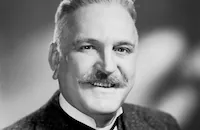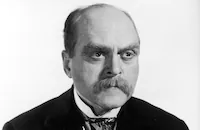Piccadilly Jim

Brief Synopsis
Cast & Crew
Robert Z. Leonard
Robert Montgomery
Frank Morgan
Madge Evans
Eric Blore
Billie Burke
Film Details
Technical Specs

Synopsis
American playboy Jim Crocker is a popular London cartoonist known as "Piccadilly Jim," whose confidants are his father, a perpetually unemployed Shakespearean actor, and Bayliss, his impeccable valet. When James Crocker reports to his son that he has fallen in love and wants to marry Eugenia Willis, everything seems fine, except that Eugenia's sister, Nesta Pett, and her brother-in-law, Herbert Pett, the "Rag King" of America, do not approve of James, whom they think is a fortune hunter. To alleviate their fears, James has told them that Jim is a world renown artist, like Michelangelo. That night, while out on the town, Jim meets Ann Chester and becomes immediately infatuated with her, but because she is escorted by Lord Freddie Priory, she will not reveal her name or address. He tries to see her again the next day, which she is riding, but she still is cool to him. He then remembers that he was supposed to meet with Eugenia's social climbing sister and brother-in-law and shows up drunk, alienating Nesta, who also thinks that Jim's caricatures are not socially acceptable. Though Eugenia and James are worried, Jim assures them that everything will be all right, but soon receives a dismissal notice from his editor because of overdue deadlines. The Petts then take Eugenia to the Continent. While James worries about her, Jim tries unsuccessfully to find Ann. As a depressed Jim idly sketches a few caricatures of the Pett family, Bayliss suggests that they are hilarious and Jim decides to turn the family's antics into a cartoon strip. The strip, called "From Rags to Riches," featuring the "Richwitch Family," becomes the hit of London, so that when the Petts return to England, they are greeted with howls of laughter by fans who recognize them as the Richwitch prototypes. The Petts are even more furious with Jim, and Ann, who turns out to be the Petts's niece, vows to get even if she ever meets "Piccadilly Jim." When James shows Jim the family's picture in the paper, he recognizes Ann and goes to her, but does not reveal his identity. After an afternoon with her, he decides to follow her and the Petts to the United States, posing as Bayliss' son, and resolves to make his characters more benevolent. As a result, Americans reading the strip love the "Richwitch" family and the Petts revel in the attention. Ann soon learns Jim's real identity, though, and is furious. When Jim goes to the Pett home to see Ann, who refuses to accept his daily gifts, the Petts are delighted to see him and say that Eugenia is now engaged to a Danish Count named Olav Osrio (whom Nesta and Herbert fail to notice is actually a bearded James) and Ann is engaged to Freddy. Because Bayliss has suspected that Freddy is a bogus aristocrat, Jim tries to discredit him, but at a dinner party at the Pett home Jim's plan backfires. When he promises to "unmask" the imposter, the count stands up and confesses that he is really James, and Freddy turns out to be a genuine lord. Finally determining that everything has gone wrong for him and Ann, Jim decides to leave after offering to bestow a generous dowery on Eugenia and his father. On the boat back to England, Jim finally is victorious when Ann arrives, deciding she would have more fun being his wife than Freddy's.

Director

Robert Z. Leonard
Cast

Robert Montgomery

Frank Morgan

Madge Evans

Eric Blore

Billie Burke

Robert Benchley

Ralph Forbes

Cora Witherspoon
Tommy Bupp
Aileen Pringle

Grant Mitchell

E. E. Clive

Billy Bevan
Grayce Hampton

Stanley Morner

Bud Flanagan
Sidney Miller
Torben Meyer
Crew
Dr. William Axt
Charles Brackett
James Brock
Cedric Gibbons
William S. Gray
Samuel Hoffenstein
Edwin Knopf
Robert Z. Leonard
Harry Rapf
Sandy Roth
Joseph Ruttenberg
Douglas Shearer
Lynn Starling
Dolly Tree
Edwin B. Willis
Joseph Wright

Film Details
Technical Specs

Articles
Piccadilly Jim

Piccadilly Jim
Picadilly Jim - Piccadilly Jim
Like his fictional lead character here, English humorist Wodehouse specialized in gentle lampoons of the upper crust himself. His best-known work is a series of books and stories recounting the foibles of likeable but dimwitted gentleman Bertie Wooster and his sharp and sensible valet Jeeves. Loaded with affectionate satire and engaging wordplay, Wodehouse's style comes through in much of the film, despite changes in plot and character elements in the adaptation by a number of writers, chiefly Charles Brackett. No stranger himself to sharp satire and sophisticated wit, Brackett and colleague Billy Wilder were responsible for the excellent screenplays of such comedies as Midnight (1939), Ninotchka (1939) and Ball of Fire (1941). Their partnership continued through Wilder's transition to director, culminating in perhaps their greatest triumph, Sunset Boulevard (1950). Brackett won an Academy Award for his work on that classic, as well as for Titanic (1953) and The Lost Weekend (1945), also directed by Wilder.
Montgomery has a lot of great character actors to play off in this picture. His conniving father is played by Frank Morgan, most widely recognized as the title character of The Wizard of Oz (1939), but an actor of great range whose career spanned from the pre-World War I era through the late 40s and included musicals (Broadway Melody of 1940, 1940), comedies (Bombshell, 1933; The Shop Around the Corner, 1940) and dramas (The Mortal Storm, 1940; Tortilla Flat, 1942, which earned him a Best Supporting Actor Oscar® nomination). The object of his affection is played by Billie Burke, also a cast member in The Wizard of Oz (Glinda the Good Witch) and more than 80 other films. Bayliss the Butler is, of course, the screen's all-time great flustered domestic, Eric Blore, who played valets and butlers in dozens of pictures over the course of more than three decades, attending to the needs of such stars as William Powell, Fred Astaire, Joel McCrea, Leslie Howard and Herbert Marshall. There is also an appearance by American humorist, screenwriter and sometimes actor Robert Benchley, who worked on the screenplay for Piccadilly Jim in its early stages but received no credit.
Finally, the picture benefits from the assured direction of Robert Z. Leonard, working on his fourth and final film with Montgomery. Although never classed among the great directors of American cinema, Leonard built a solid career as a workhorse at MGM, one who could be counted on to turn out efficient, popular vehicles for the studio's stable of stars. It speaks well for the regard in which he was held by Metro executives that he was regularly assigned projects for the three queens of the lot in the 1930s, Greta Garbo (he directed her first American screen test), Norma Shearer and Joan Crawford, as well as such important properties as Jeannette MacDonald and Nelson Eddy, Judy Garland and Greer Garson. He was also at the helm of such big-budget prestige pictures as The Great Ziegfeld (1936) and Pride and Prejudice (1940). It speaks volumes for Leonard's indelible connection to the studio that between 1925 (a year after its founding) and the end of his career in 1957 (a period encompassing more than 60 films), he only worked entirely outside MGM a few times.
The Wodehouse story was adapted for the screen once before, in 1920, and again in 2004, with Sam Rockwell in the role of Jim. The screenplay for the remake was written by Julian Fellowes, Academy Award winner for Gosford Park (2001).
A handful of reviews that accompanied the release of Piccadilly Jim sum up the picture's appeal quite well. Although not overwhelmed by the movie, Variety admitted "Its function is to entertain in a snappy yet simple and innocuous manner, with interesting people as the characters." The New York Evening Journal praised its star with: "Give Bob Montgomery an impudent role and he goes to town." Montgomery certainly added to his credit another solid performance in the kind of role he did so well (and, to his dismay, so often) in the 1930s. But MGM had little faith in the picture and refused to promote it. Without sufficient word of mouth to save it, the film rather quickly faded at the box office.
Director: Robert Z. Leonard
Producers: Robert Z. Leonard, Harry Rapf
Screenplay: Charles Brackett, Edwin H. Knopf, based on the novel by P.G. Wodehouse
Cinematography: Joseph Ruttenberg
Editing: William S. Gray
Art Direction: Cedric Gibbons
Original Music: William Axt
Cast: Robert Montgomery (Jim Crocker), Frank Morgan (James Crocker, Sr.), Madge Evans (Ann Chester), Billie Burke (Eugenia Willis), Robert Benchley (Bill Macon), Eric Blore (Bayliss).
BW-95m.
By Rob Nixon
Picadilly Jim - Piccadilly Jim
Quotes
Trivia
Notes
In P. G. Wodehouse's novel, which was serialized in The Saturday Evening Post, "Jim" and "Ann" are cousins by marriage, and "Jim" is a magazine writer who publishes a scathing review of Ann's poetry. Although this and other aspects of the stories differ, many of the characterizations and situations are similar in the novel and film. According to news items in Hollywood Reporter, the film was initially to be produced by then M-G-M producer David O. Selznick in early 1935, with songs provided by Harold Adamson and Burton Lane. A October 26, 1934 news item in Hollywood Reporter notes that Rowland Lee was assigned by Selznick to complete work on the screenplay, which was initially written by Robert Benchley. J. Walter Ruben was set to direct the picture at that time, and Chester Hale was said to be working on dances for the picture in early November 1934. The production was "shelved" in 1935, then re-scheduled for late 1935, when writers Brian Marlow and Edwin Knopf were assigned to write the script. Harlan Ware was then added to the writing staff, followed by Manny Seff, who was to polish the script with Knopf after Marlow and Ware completed their work. All writers left the project in early September 1935, with the exception of Knopf, who received co-screenplay credit with Charles Brackett. Screen Achievements Bulletin credits Lynn Starling and Samuel Hoffenstein with contributions to the dialogue, but does not credit any other writers, aside from Brackett and Knopf. Wodehouse's novel was also the basis for a 1919 Lewis Selznick picture, directed by Wesley Ruggles and starring Owen Moore and Zena Keefe (see AFI Catalog of Feature Films, 1911-20; F1.3445).














